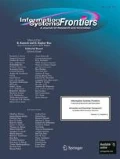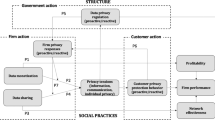Abstract
The importance of personal privacy to Internet users has been extensively researched using a variety of survey techniques. The limitations of survey research are well-known and exist in part because there are no positive or negative consequences to responses provided by survey participants. Such limitations are the motivation for this work. Experimental economics is widely accepted by economists and others as an investigative technique that can provide measures of economic choice-making that are substantially more accurate than those provided by surveys. This paper describes our efforts at applying the techniques of experimental economics to provide a foundation for (a) estimating the values that consumers place on privacy and various forms of security (encryption, HIPAA, etc.) and for (b) quantifying user responses to changes in the Internet environment. The contribution of this study is a better understanding of individual decision-making in the context of benefits and costs of making private information available to Internet sites. Preliminary results from a series of pilot studies are consistent with optimizing behaviors, indicating that continued application of experimental economics techniques in the quantification of Internet user actions in privacy/security space will be illuminating. Our results show that Internet users place great value on security measures, both regulatory and technical, that make identity theft much less likely. Our Web-based experiments indicate that privacy- and security- enhancing protections are likely to be subject to moral hazard responses, as participants in our online experiments became more aggressive in their Internet usage with greater protection in place.
Similar content being viewed by others
Notes
A website describing the Iowa Electronic Markets states that, “The Iowa Electronic Markets are real-money futures markets in which contract payoffs depend on economic and political events such as elections,” available at: http://www.biz.uiowa.edu/iem/.
The Privacy Place™ contains an extensive collection of published works, by the authors and others, about Internet user privacy and security http://theprivacyplace.org/).
This statement is made after searching both the information technology (IT) and experimental economic literature.
26 USCS Section 9802 (2004).
In the pilot experiment we assumed that equilibrium was achieved after five iterations.
There are certainly some studies that suggest there are negative externalities associated with “adult” websites, especially those that appeal to pedophiles.
References
Ackerman, M. S., Cranor, L. F., & Reagle, J. (1999). Privacy in e-commerce: Examining user scenarios and privacy preferences. In Proceedings of the first ACM conference on electronic commerce (pp. 1–8).
Acquisti, A., & Varian, H. R. (2005). Conditioning prices on purchase history. Marketing Science, 24(3), 1–15.
Anderson, R. (2001). Why information security is hard–an economic perspective. In Proceeding of 17th annual computer security applications conference, New Orleans, Louisiana.
Antón, A. I., & Earp, J. B. (2001). Strategies for developing policies and requirements for secure electronic commerce systems. In A. K. Ghosh (Ed.), E-commerce security and privacy (pp. 29–46). Dordecht, The Netherlands: Kluwer.
Baumer, D. L., Earp, J. B., & Payton, F. C. (2000). Privacy of medical records: IT implications of HIPAA. ACM Computers and Society, 30(4), 40–47.
Baumer, D. L., Earp, J. B., & Poindexter, J. C. (2004). Internet privacy law: A comparison between the United States and the European Union. Computers and Security, 23(5), 400–412 (July).
Becker, G. B. (1962). Irrational behavior and economic theory. Journal of Political Economy, 70, 1–13.
Bellotti, V. (1997). Design for privacy in multimedia computing and communications environments. In P. E. Agre & M. Rotenberg (Eds.), Technology and privacy: The new landscape (pp. 63–98). Cambridge: MIT.
Brown, P. M. (1995). Learning from experience, reference points, and decision costs. Journal of Economic Behavior and Organization, 27, 3–13.
Clarke, R. (1999). Internet privacy concerns confirm the case for intervention. Communications of the ACM, 42, 60–67.
Culnan, M., & Armstrong, P. (1999). Information privacy concerns, procedural fairness, and impersonal trust: An empirical investigation. Organization Science, 10, 104–115.
Earp, J. B., Antón, A. I., Aiman-Smith, L., & Stufflebeam, W. (2005). Examining Internet privacy policies in the context of user privacy values. IEEE Transactions on Engineering Management, 52(2), 227–237 (May).
Earp, J. B., & Baumer, D. (2003). Innovative web use to learn about user behavior and online privacy. Communications of the ACM, 46(4), 81–83 (April).
Earp, J. B., Poindexter, J. C., & Baumer, D. L. (2004). Modeling privacy values with experimental economics. In Paper presented to the Workshop for Privacy in an Electronic Society (Oct. 2004).
Fevrier, P., & Visser, M. (2004). A study of consumer behavior using laboratory data. Experimental Economics, 7, 93–114.
Forsythe, R., Horowitz, J. L., Savin, N. E., & Sefton, M. (1994). Fairness in simple bargaining experiments. Games and Bargaining Behavior, 6, 347–369.
Gordon, L., & Loeb, M. (2002). The economics of information security investment. ACM Transactions on Information and System Security, 5(4), 438–457.
Harris, L., et al. (1991, 1994, 1996, 1998). Harris-Equifax user privacy surveys. Atlanta, Georgia: Equifax.
Horn, I., Hui, K., Lee, T., & Png, I. P. L. (2002). Online information privacy: Measuring the cost-benefit trade-off paper presented at the twenty-third international conference on information systems.
Hui, K., Teo, H., & Lee, S. (2006). The value of privace assurance. MIS Quarterly (in press).
Milberg, S. J., Smith, J. H., & Burke, S. J. (2000). Information privacy: Corporate management and national regulation. Organization Science, 11(1), 35–37.
Raul, A.P. (2002). Privacy and the Digital State: Balancing Public Information and Personal Privacy, Boston, MA: Kluwer.
Savage, L. J. (1971). Elicitation of personal probabilities and expectations. Journal of the American Statistical Association, 66(336), 783–801 (December).
Shoemaker, P. (1991). Choices involving uncertain probabilities: Tests of generalized utility models. Journal of Economic Behavior and Organization, 16, 295–305.
Sippel, R. (1997). An experiment on the pure theory of consumer’s behavior. Economic Journal, 107, 1431–1444.
Smith, V. (2003). Constructivist and ecological rationality in economics. American Economic Review, 93(3), 465–508 (A version of Smith’s address to the Nobel Committee in 2002), http://www.law.gmu.edu/////////currnews/smith-lecture.html.
Sullivan, B. (2005). ID theft again tops list of the FTC complaints. http://www.msnbc.msn.com/id/6891556/, Feb.
Wathieu, L., & Friedman, A. (2005). An empirical approach to understanding privacy valuation. In Proceedings of the workshop on the economics of information privacy (WEIS) (2005).
Acknowledgment
The authors would like to thank the College of Management at North Carolina State University for funding for software development and IBM for financial support that allowed real rewards to accompany more successful optimizing decisions by experiment participants.
Author information
Authors and Affiliations
Corresponding author
Additional information
Revised for: Information Systems Frontiers, Special Issue on the Economic Aspects of Information Security.
Rights and permissions
About this article
Cite this article
Poindexter, J.C., Earp, J.B. & Baumer, D.L. An experimental economics approach toward quantifying online privacy choices. Inf Syst Front 8, 363–374 (2006). https://doi.org/10.1007/s10796-006-9013-4
Published:
Issue Date:
DOI: https://doi.org/10.1007/s10796-006-9013-4




